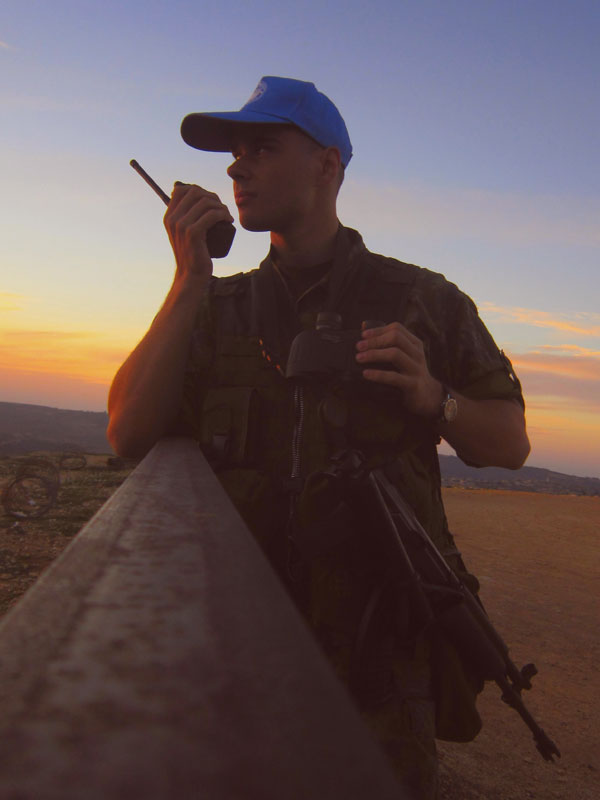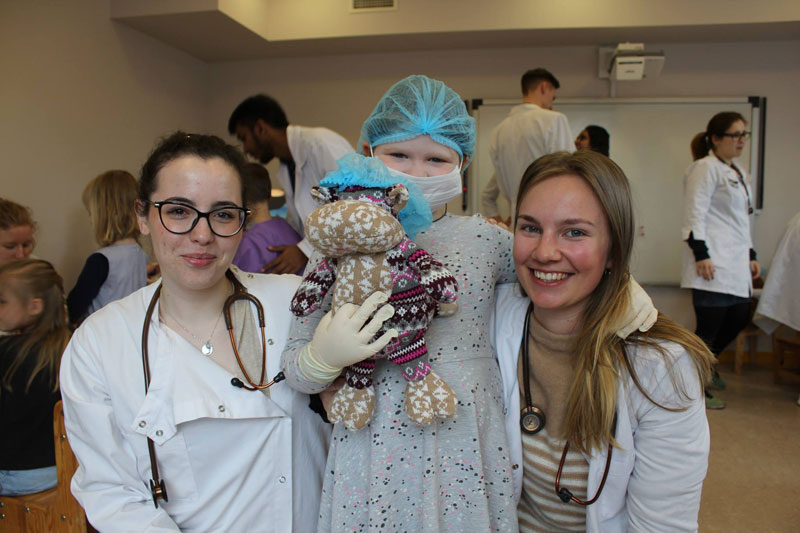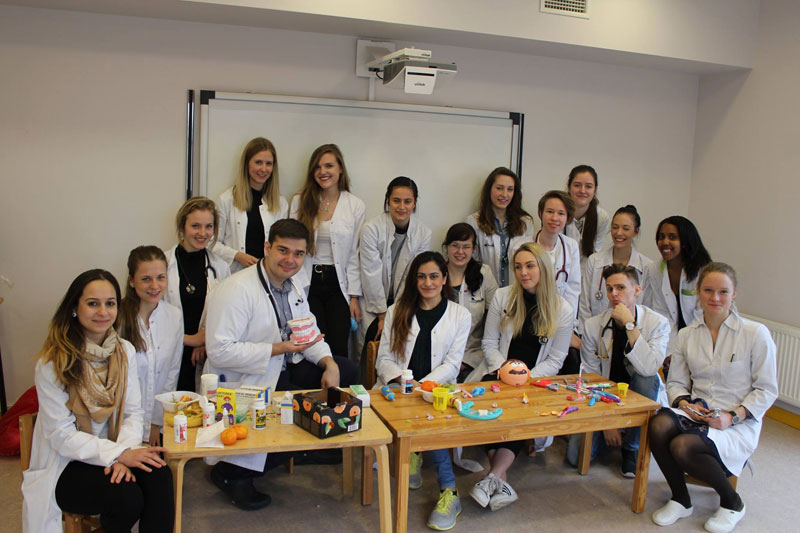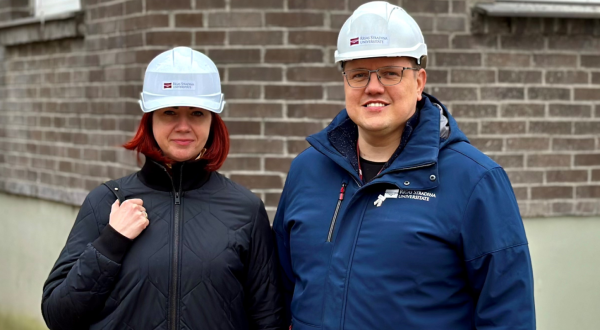From Teddy Bear Hospital to international crisis management in Syria
Doctors frequently have to face unusual challenges and handle difficult patients – these might be children afraid of doctors or soldiers requiring medical assistance in conflict zones. Within our themed series of interviews “Doctor – it is a mission” we interviewed RSU medical student Vili Pehkonen who shared with us his experiences at RSU and his plans for the future.
 Tell us about yourself.
Tell us about yourself.
I am 25 years old and come from Tampere, the third largest city in Finland. I am the youngest child in my family and before launching into studies at RSU I served compulsory military service in the Finnish Defence Forces, followed by voluntary military service in Lebanon within the UN peacekeeping mission.
I see myself as a down-to-earth, hardworking and determined individual. After graduation I would take the opportunity to go on at least one more mission to conflict or disaster zones, this time not as a soldier, but instead – as a doctor so that I could make proper use of the medical knowledge I have acquired.
Please describe your experience as a UN peacekeeper.
This was truly an eye-opening experience and felt like a natural transition after my compulsory military service. I ended up serving in Lebanon together with men whom I had met during my military service and who had also taken the decision to volunteer, so the comradeship and team spirit was high. We arrived in Lebanon at the end of the year and had to experience the seasons changing – from freezing cold to scorching summer heat.
During the mission I had the chance to meet and communicate with locals which was a valuable opportunity to understand their way of living, customs, traditions and culture. If I were at the starting point and would have to decide on going on this mission, I would definitely not change anything, the time spent in Lebanon taught me valuable lessons about diversity, religions, traditions and myself.
What did motivate you to join the peacekeeping mission?
Maybe it was a thirst for adventure that pushed me to apply for the international military crisis management operation to see something extraordinary and to get this once-in-a-lifetime experience. Finland has a long history of peacekeeping and crisis management operations starting from Suez in 1956, so being part of this history was also a factor. And to be honest, the salary was also pretty good.
Why did you choose to study at RSU?
Arriving at RSU was more or less a pragmatic choice. It is rather difficult to get accepted by a medical university in Finland; it usually takes some 2 to 3 years and multiple attempts to pass the entrance exams. Before military service I tried to apply once and after returning from Lebanon at the age of 21 I asked myself, “Why would I spend 2 or even 3 more years just applying to a Finnish university, when I can get equally good education at RSU and launch into studies immediately?”
The very idea and encouraging words from a friend of mine, who had been accepted by RSU a year before convinced me that this was the proper choice to be made and I haven’t regretted it since.
Why do you want to become a doctor or medical professional?
To be honest, it is hard to give a proper answer. I have always thought that no matter what career I would choose to pursue, it has to be challenging and rewarding at the same time. In addition to that I have always had a thirst for adventure and travelling. So putting these preferences in one, I would say that becoming a doctor suits me like a glove – or, as we say in Finland, sopii kuin nyrkki silmään (Eng. – fits like a fist in the eye).
What is the Teddy Bear Hospital?
Teddy Bear Hospital (TBH) is a project aimed at allaying the fears children commonly have of visiting a doctor, having medical procedures or of the medical environment as such. It is a global initiative which, if I am not wrong, originated in Sweden.

At the Teddy Bear Hospital, each medical student takes the role of a mentor over a child (aged 2–6) and demonstrates how to treat various ailments on the childs’ favourite toy – Teddy Bear, Penguin, Doll, Unicorn etc. To acquaint with and better understand the treatment process in a friendly environment this year at Ķīpsala International School we had built five different stations: a surgery, laboratory, dentistry, pharmacy and general examination.
So, a teddy bear with a severe cough underwent a chest x-ray examination, we could check its vitals, administer some pills to alleviate the symptoms, take a microbiological sample. The children at the Teddy Bear Hospital are allowed to participate in the treatment process, some even dressed up in scrubs and performed surgery. It is up to the child’s imagination what their Teddy Bear is suffering from and we are there to help with diagnosis and treatment.
The main goal of this initiative is to reduce anxiety and fear of medical procedures, staff and the clinical environment. Such a daunting task is hard to accomplish on the spot, nevertheless we at the ISA hope that this will be a helpful experience both – for kids and also for prospective medical professionals, keeping in mind that work with children can be challenging.
How did it begin?
The project at RSU was launched by the ISA a few years ago and we have had the pleasure to collaborate with two international schools so far. This spring we went to Ķīpsala, and we plan to visit the International School of Latvia in Piņķi (ed. – suburban area of Rīga) later this autumn.
What is your role? Who else is involved?
I was taking more of a coordinator’s role; much credit for the organisation and success of the event must be given to Dita Dāle from the ISA who was the driving force behind it. In this connection I also have to mention the former ISA board member Alex Wyckoff-Mähler who shared his experience of participating in other THB projects and gave truly valuable advice.
On this occasion I would like to express my gratitude to the entire ISA team because without such a supportive team the event would not have been half as fun to organise; the volunteers deserve immense thanks as well, but without doubt the greatest appreciation goes to children who were truly dedicated, passionate and interested in the event. They were the true inspiration and made the day wonderful and a lot of happy memories to be kept for our future professional lives.
What do you think are the greatest achievements or benefits of this initiative?
The largest benefit certainly is the confidence and conviction given to children that seeing a doctor or undergoing medical treatment is by far not that unpleasant. Experiences like these help overcome the possible fear of seeing a doctor in the future.
For volunteers it is a huge opportunity to gain significant knowledge and practical experience in how to work and deal with children in their future workplaces and how to build up an environment of confidence and safety for a child.
Are there any other charitable or social activities in which you are personally involved?
If I have the time, I gladly take part in diverse social events, no matter where and what – a get-together at the local parish in my hometown, a party for my fellows during military service or informative events at the Finnish Student Association or the ISA at RSU.
After graduation I hope to make use of the acquired skills at some place where the need is most urgent, preferably in a conflict or disaster zone.

In one of the answers you mentioned that you are thinking of returning to a conflict or disaster zone as a medical officer. What does this role mean? Where would you like to go?
My main task and responsibility would be to provide high-level medical assistance in military camps. I would be responsible for ensuring the well-being of Finnish soldiers and staff in the operational area and as much as possible, also provide medical aid to the local population.
The work would be more related to something resembling general medicine, but when needed, I would provide medical aid also in emergency situations being part of a multidisciplinary team acting with international support.
Finland is presently involved in numerous peacekeeping missions, e.g. in Iraq, Lebanon, Afghanistan, Mali etc. Who knows what the future might bring. Maybe Syria will be among possible destinations after my graduation.
Related news
 RSU is growing and developing: major reconstruction underway in the main buildingDevelopment, For RSU Employees, For Students
RSU is growing and developing: major reconstruction underway in the main buildingDevelopment, For RSU Employees, For Students


